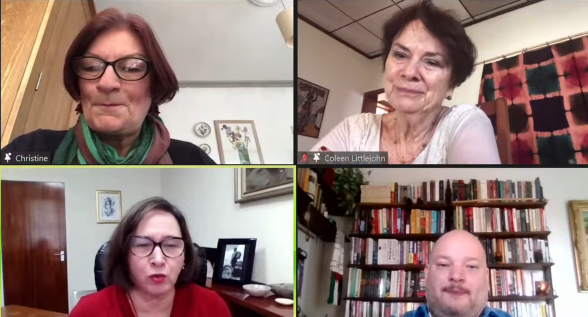By Tim Young, Venezuela Solidarity Campaign.
Saturday February 13 saw hundreds of British labour movement and solidarity activists attend an event hosted by the Cuba Solidarity Campaign, Nicaragua Solidarity Campaign Action Group and Venezuela Solidarity Campaign.
The event was chaired by Christine Blower, Labour member of the House of Lords and former General Secretary of the National Union of Teachers, and featured H.E. Bárbara Elena Montalvo Álvarez, Cuban Ambassador, Carlos Ron, President of the Simon Bolivar Institute of Venezuela, Maite Mola, Vice President, Party of the European Left, Manu Pineda, Spanish United Left MEP and Coleen Littlejohn, international development worker, Nicaragua-based for 41 years.
All the speakers addressed the political context of the last four years – the Trump administration’s intensification of illegal U.S sanctions against Cuba, Venezuela and Nicaragua with the aim of forcing ‘regime change’. Aided and abetted by the EU and UK, this aggressive action has been deeply damaging to the Latin American countries’ respective economies and societies, including their efforts to deal with the coronavirus pandemic. But with Joe Biden now in the White House, what are the prospects for the future?
The speakers’ contributions made ten key points:
- First and foremost, sanctions are illegal coercive measures designed to bring about regime change, install US client governments, destroy progressive achievements and reinstate neoliberal policies.
- In all three countries, sanctions have been coupled with lavish US funding for opposition groups (often employing violent methods) to create social and economic disorder and destabilise elected governments.
- Sanctions are illegal under international law. It is only the United Nations Security Council that has the right to impose such measures. So whatever one’s view of the three countries and their governments, support is sought on the basis that they are being subjected to unlawful aggression.
- Sanctions are not simply illegal, coercive measures: they amount to a form of collective punishment against humanity – in this instance the populations of Cuba, Nicaragua and Venezuela. This is a crime under the Geneva Conventions.
- The US has no coherent answer to this charge of illegality and its attempted defence of saying that the sanctions are not intended to harm the people does not stand up to scrutiny – as is clearly demonstrated, for example, by the recent findings from her visit to Venezuela by the UN Special Rapporteur on the negative impact of unilateral coercive measures on the enjoyment of human rights.
- Nor is the US’s argument compelling that exemptions to sanctions on humanitarian grounds make them defensible. As the Special Rapporteur’s report makes clear, existing humanitarian exemptions are ineffective, insufficient and subject to lengthy and costly procedures. In addition, there is a persistent problem of over-compliance with sanctions that prevents the purchase of essential goods even within the licences issues by the US Government.
- Under Trump, all three states have experienced an alarming extension in the breadth and harshness of the sanctions levied against them. During the period from April 2019 – March 2020, for example, the US introduced 90 new economic actions and measures against Cuba, reaching unprecedented levels of hostility. The annual cost to Cuba of the blockade now tops $5 billion. For Nicaragua, the “Nica Act” (Nicaraguan Investment Conditionality Act), introduced by Trump in December 2018, led to the World Bank and the Inter-American Development Bank closing most of its programmes assisting Nicaragua with loans that the government were investing in education, social programmes, electrification, roads and other infrastructure initiatives. In Venezuela, the raft of sanctions now amounts to a blockade virtually indistinguishable from that imposed on Cuba, with similarly far-reaching effects: the Washington-based Centre for Economic and Policy Research has calculated that US sanctions led to more than 40,000 deaths in 2017-18 alone.
- The impact of sanctions has been even more worrying because of their continued application and intensification during the pandemic, affecting each country by restricting imports of medicines and medical supplies and increasing overall costs. Despite this, their achievements in combatting the pandemic are enviable when compared to richer countries. Cuba has even managed to send 4,000 medical staff to other countries to assist them in tackling the pandemic. There is much the US could learn if improved relations allow the sharing of experiences.
- There is high-level opposition to sanctions, whether calling for them to be suspended during the pandemic or opposed outright. In March 2020 UN Secretary-General Antonio Guterres called for the waiving of sanctions saying: “This is the time for solidarity not exclusion.” The Pope has also appealed for an end to sanctions preventing countries from “providing adequate support to their citizens.” In Europe, the Party of the European Left has opposed the imposition of sanctions as illegal and has called for the return of Venezuelan money held illegally by countries such as Britain and Portugal. Cuba’s presentation of its anti-blockade motion to the UN General Assembly in May 2021 offers further opportunities to widen international support against all illegal sanctions.
- From all three countries there is a clear and unequivocal message: our sovereignty must be respected. Now that Trump has gone and Biden has become President, there is an opportunity for diplomacy and dialogue to offer a way forward, while reserving the right to defend themselves against aggression.
Christine Blower concluded the meeting by urging everyone to join the solidarity campaigns, noting that now more than ever it is vital to step up our expressions of international solidarity and against the use of illegal sanctions.
- Get involved: https://cuba-solidarity.org.uk/get-involved/join/
- https://www.nscag.org/join-us/
- www.venezuelasolidarity.co.uk/join
This article first appeared in Labour Outlook

